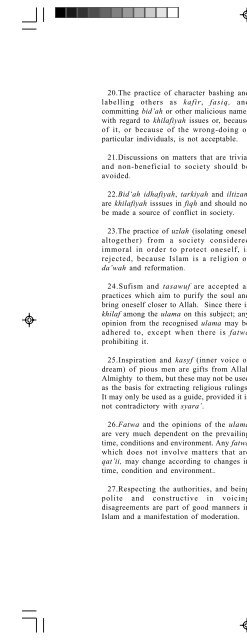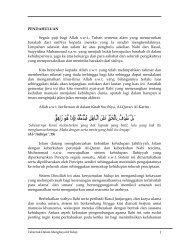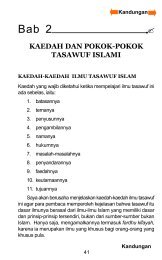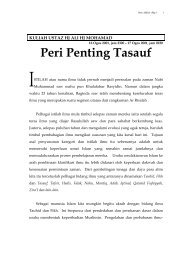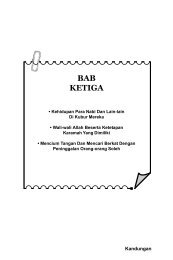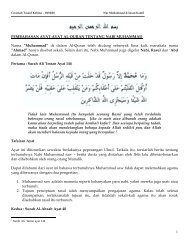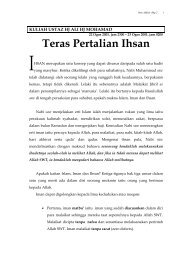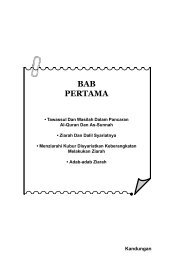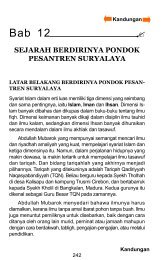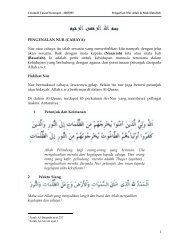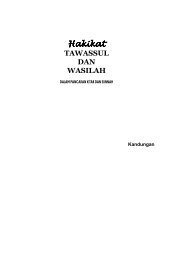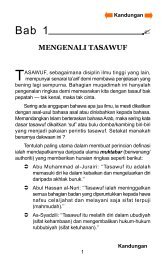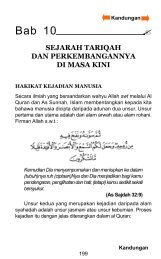inab3 cover front.psd - Khadijah Mosque
inab3 cover front.psd - Khadijah Mosque
inab3 cover front.psd - Khadijah Mosque
Create successful ePaper yourself
Turn your PDF publications into a flip-book with our unique Google optimized e-Paper software.
20.The practice of character bashing and<br />
labelling others as kafir, fasiq, and<br />
committing bid’ah or other malicious names<br />
with regard to khilafiyah issues or, because<br />
of it, or because of the wrong-doing of<br />
particular individuals, is not acceptable.<br />
21.Discussions on matters that are trivial<br />
and non-beneficial to society should be<br />
avoided.<br />
22.Bid‘ah idhafiyah, tarkiyah and iltizam<br />
are khilafiyah isssues in fiqh and should not<br />
be made a source of conflict in society.<br />
23.The practice of uzlah (isolating oneself<br />
altogether) from a society considered<br />
immoral in order to protect oneself, is<br />
rejected, because Islam is a religion of<br />
da’wah and reformation.<br />
24.Sufism and tasawuf are accepted as<br />
practices which aim to purify the soul and<br />
bring oneself closer to Allah. Since there is<br />
khilaf among the ulama on this subject; any<br />
opinion from the recognised ulama may be<br />
adhered to, except when there is fatwa<br />
prohibiting it.<br />
25.Inspiration and kasyf (inner voice or<br />
dream) of pious men are gifts from Allah<br />
Almighty to them, but these may not be used<br />
as the basis for extracting religious rulings.<br />
It may only be used as a guide, provided it is<br />
not contradictory with syara’.<br />
26.Fatwa and the opinions of the ulama<br />
are very much dependent on the prevailing<br />
time, conditions and environment. Any fatwa<br />
which does not involve matters that are<br />
qat’ii, may change according to changes in<br />
time, condition and environment..<br />
27.Respecting the authorities, and being<br />
polite and constructive in voicing<br />
disagreements are part of good manners in<br />
Islam and a manifestation of moderation.<br />
PROPOSED ACTIONS<br />
TO NURTURE<br />
MODERATION & DEAL WITH EXTREMISM<br />
To nurture moderation in the practice of<br />
Islam, and to overcome extremist tendencies,<br />
we propose the following actions;<br />
1. Extensively educate the community on<br />
the accurate Tasawur (world view) of Islam.<br />
May consider to include the study of Islamic<br />
Tasawur in madrasahs.<br />
2. Popularise the learning of the syariah<br />
decision-making tools and processes among<br />
Muslims. These include the sciences of the<br />
Hadith, Ulum Al-Quran, Usul Fiqh and<br />
Qawa‘id Fiqhiyah. This will open up their<br />
minds to the broader perspective of Islam<br />
on any one issue.<br />
3. Popularise the learning of comparative<br />
fiqh to open up the community’s minds to<br />
the diversity of opinions of the ulama on<br />
any one issue.<br />
4. Popularise contemporary fiqh views.<br />
5. Streamline the ulama’s viewpoints on<br />
important issues.<br />
6. Engage and interact with extremist<br />
groups via dialogue and discussions.<br />
7. Narrow the gap between the ulama,<br />
leaders and youth.<br />
8. Clarify issues that arise.<br />
9. Refrain from being harsh and extreme in<br />
dealing with extremism.<br />
10.Safeguard manhaj syar’ii (correct<br />
methodology) in istidlal and istinbat<br />
(deducing a ruling from the sources of the<br />
syariah) before issuing any ruling.<br />
11.Stay clear of creating controversies,<br />
confusion and antagonism within the<br />
community.<br />
12.Stay clear of actions which create<br />
controversies, confusion and antagonism<br />
towards Islam and Muslims.<br />
Masjid <strong>Khadijah</strong> 53


